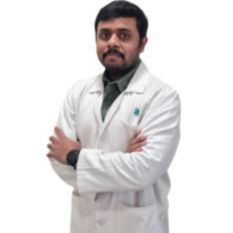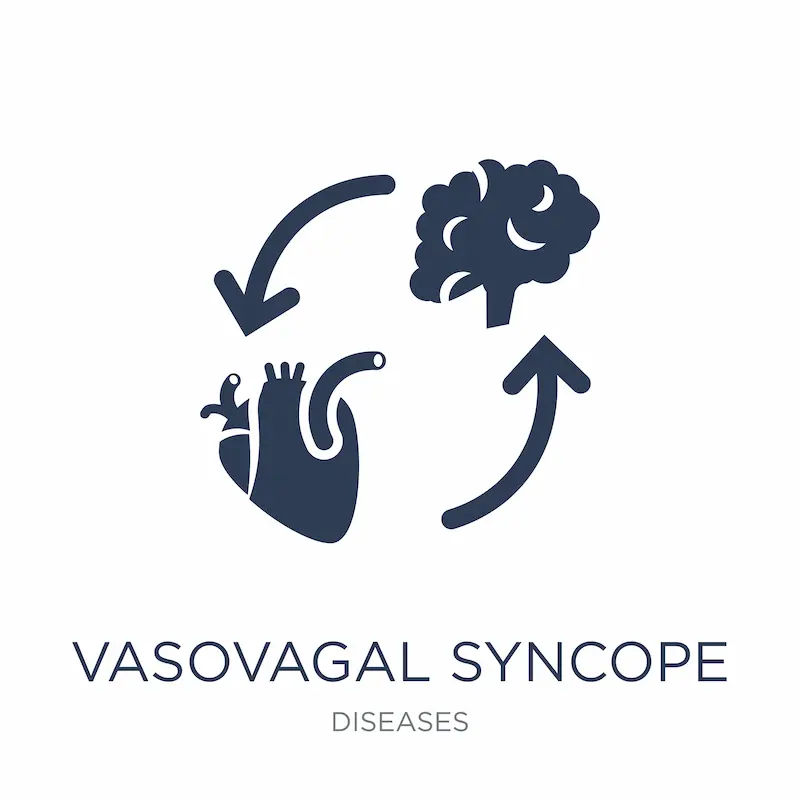Understanding Vasovagal Syncope: What You Need to Know
Learn about vasovagal syncope: its causes, symptoms, and how to manage fainting episodes. Get the information you need.

Written by Dr.Sonia Bhatt
Last updated on 3rd Jul, 2025

Vasovagal syncope, commonly known as fainting, is one of the most frequent reasons people experience sudden, temporary loss of consciousness. While fainting may seem alarming, it's usually not a sign of a serious health problem. However, it can still be unsettling for those who experience it and for those around them. By understanding vasovagal syncope—what it is, what triggers it, and how to manage and prevent episodes—you can feel more confident and in control if you or someone you know is prone to fainting. In this guide, we'll explain the causes of vasovagal syncope, how it happens, common symptoms, and what you can do to reduce the likelihood of fainting episodes.
What Is Vasovagal Syncope?
Vasovagal syncope, commonly known as fainting, is a sudden loss of consciousness caused by a drop in blood pressure, leading to decreased blood flow to the brain. It's the most common type of fainting episode and usually occurs when the body overreacts to certain triggers.
How It Happens
Here’s a detailed look at how a vasovagal syncope episode typically unfolds:
Trigger: The process begins when something triggers your body’s reaction. Common triggers include stress, pain, standing for long periods, dehydration, or even the sight of blood.
Vagal Response: The vagus nerve, which is part of your autonomic nervous system, gets activated. It sends signals that slow down your heart rate and cause your blood vessels to dilate (expand).
Drop in Heart Rate and Blood Pressure: As a result of the vagus nerve's response, your heart rate slows (a condition called bradycardia), and your blood vessels dilate, causing your blood pressure to drop.
Reduced Blood Flow to the Brain: With lower blood pressure and a slower heart rate, less blood flows to the brain. This lack of oxygen-rich blood leads to fainting.
Recovery: After fainting, lying down often restores normal blood flow to the brain, leading to a quick recovery. Typically, consciousness is regained within a few minutes, and most individuals feel fine shortly after.
Common Triggers of Vasovagal Syncope
Vasovagal syncope can be triggered by a variety of factors, often related to stress, physical strain, or environmental conditions. Here are some common triggers:
Emotional Stress: Strong emotions such as fear, anxiety, or the sight of blood can trigger a vasovagal response.
Pain: Intense pain from injuries, medical procedures, or other sources can lead to fainting.
Prolonged Standing: Standing for long periods, especially in hot or crowded places, can cause blood to pool in the legs, reducing blood flow to the brain.
Dehydration: Lack of adequate fluids can lower blood pressure and increase the risk of fainting.
Hunger: Low blood sugar levels can trigger a vasovagal episode.
Sudden Changes in Position: Rapidly standing up from a sitting or lying position can cause a drop in blood pressure.
Heat Exposure: Being in a hot environment can lead to dehydration and dilation of blood vessels, increasing the risk of fainting.
Straining: Activities like heavy lifting, coughing, or straining during bowel movements can trigger vasovagal syncope.
Symptoms and Warning Signs of Vasovagal Syncope
Before you faint, your body usually gives you some warning signs. Common warning signs of vasovagal syncope include:
Lightheadedness or dizziness: A feeling of spinning or imbalance.
Nausea: A queasy or unsettled stomach.
Sweating: Profuse sweating, especially cold sweats.
Blurred or tunnel vision: You may notice your vision narrowing or becoming blurry.
Pale skin: Your skin may look pale or ashen.
Feeling warm or hot: A sudden warmth, especially in the face or neck.
Cold, clammy sweat: A chilled, sweaty feeling.
Weakness: A feeling of weakness or fatigue.
If you experience any of these symptoms, it’s important to lie down or sit with your head between your knees to help improve blood flow to your brain and prevent fainting.
Consult Top Urologists
Diagnosing Vasovagal Syncope
If you experience recurrent fainting episodes, it’s important to consult a healthcare provider to rule out other potential causes, such as heart problems or neurological conditions. Your doctor will perform a thorough physical examination, check your heart rate and blood pressure, and review your medical history, including any triggers or warning signs.
To diagnose vasovagal syncope, your healthcare provider may recommend several tests, such as:
Tilt Table Test: In this test, you are strapped to a table that tilts from a lying down position to an upright position. This helps assess how your body responds to changes in position and can trigger an episode of vasovagal syncope under controlled conditions.
Electrocardiogram (ECG): This test monitors your heart’s electrical activity to ensure that there are no underlying heart issues that could be causing fainting.
Blood Tests: Blood tests may be performed to check for conditions like anaemia, dehydration, or low blood sugar.
Echocardiogram: An ultrasound of the heart to rule out structural issues that could be contributing to fainting.
Treatment and Management of Vasovagal Syncope
Managing vasovagal syncope involves adopting a combination of lifestyle modifications, preventive strategies, and medical interventions when necessary. Here’s a comprehensive approach:
Lifestyle Modifications
Stay Hydrated: Ensure adequate fluid intake to maintain blood volume and prevent dehydration, which can trigger fainting episodes.
Identify and Avoid Triggers: Recognize common triggers such as prolonged standing, extreme heat, emotional stress, and avoid them whenever possible.
Eat Smaller, Frequent Meals: Consuming smaller, more frequent meals can help prevent postprandial hypotension (a drop in blood pressure after eating).
Increase Salt Intake: Under the guidance of a healthcare provider, increasing salt intake can help maintain blood pressure levels.
Wear Compression Stockings: These can improve blood circulation in the legs and reduce blood pooling.
Preventive Strategies
Change Positions Slowly: Avoid standing up too quickly from sitting or lying down. Gradually transition to allow the body to adjust.
Practice Physical Counterpressure Maneuvers: Techniques like leg crossing, handgrip, and arm tensing can help increase blood pressure and prevent fainting.
Stay Cool: Avoid hot environments and keep cool, especially during physical activities.
Medical Interventions
Medications: In some cases, medications may be prescribed to manage vasovagal syncope. These can include:
Beta-Blockers: To help regulate heart rate.
Fludrocortisone: To increase blood volume.
Selective Serotonin Reuptake Inhibitors (SSRIs): To prevent fainting episodes.
Behavioural Therapy: Cognitive-behavioral therapy (CBT) and biofeedback can assist in managing stress and anxiety, which are common triggers for vasovagal syncope.
Pacemaker: In rare cases where other treatments are ineffective, a pacemaker may be implanted to regulate the heartbeat and prevent fainting episodes.
Behavioural Therapy
For some people, learning how to manage stress and anxiety may help prevent fainting. Techniques like biofeedback and cognitive-behavioral therapy (CBT) can help you better cope with triggers and reduce the likelihood of fainting episodes.
Living with Vasovagal Syncope
Living with vasovagal syncope means taking steps to protect yourself from fainting episodes while staying as active and independent as possible. Here are some tips for living well with this condition:
Educate Yourself and Others: Understanding your condition and sharing information about it with those around you can be empowering. If someone knows what to do during a fainting episode, it can help prevent injuries.
Carry Medical Information: Consider wearing a medical ID bracelet or carrying a card that explains your condition and the steps to take during an episode. This can be especially helpful if you faint in public or around strangers.
Create a Safe Environment: Make sure your living space is free of hazards, such as sharp corners, slippery floors, or cluttered walkways, in case you faint. If necessary, install handrails in bathrooms or stairs for added safety.
Conclusion
Vasovagal syncope, or fainting, can be managed effectively with the right knowledge and strategies. By understanding triggers, symptoms, and preventive measures, you can reduce the likelihood of episodes and improve your quality of life. Stay hydrated, avoid known triggers, and seek medical advice if fainting occurs frequently.
Educating yourself and those around you about vasovagal syncope can create a supportive environment and prevent injuries. Carrying medical information and ensuring a safe living space are crucial steps. Always consult with your healthcare provider for personalised advice and treatment options to ensure the best outcomes for your health.
Consult Top Urologists
Consult Top Urologists

Dr Manohar T
Urologist
20 Years • MBBS,MS,DND(Surgery)DNB(Urology)MD (Fellowship in Endourology & Laproscopy) Robotic Surgery Fellow
Bengaluru
Apollo Hospitals Bannerghatta Road, Bengaluru
(25+ Patients)

Dr Sriharsha Ajjur
Urologist
10 Years • MBBS,MS,Mch
Bengaluru
Apollo Hospitals Jayanagar, Bengaluru

Dr Anupam Sharma
Urologist
18 Years • MBBS, MS(Gen Surgery), DNB (Urology)
Delhi
Apollo Hospitals Indraprastha, Delhi

Dr Karthik Maripeddi
Urologist
13 Years • MBBS MS FMAS MCh URO(OSM)
Hyderguda
Apollo Hospitals Hyderguda, Hyderguda

Dr Anil Kumar T
Urologist
12 Years • MBBS, MS ( General Surgery ) , MCh (Genito-Urinary Surgery , CMC Vellore) , Fellowship in Minimally Access Surgery , Fellow- ship in Uro-Oncology and Robotic Surgery, UICC Fellowship (Geneva, Switzerland).
Bengaluru
Apollo Hospitals Jayanagar, Bengaluru
Consult Top Urologists

Dr Manohar T
Urologist
20 Years • MBBS,MS,DND(Surgery)DNB(Urology)MD (Fellowship in Endourology & Laproscopy) Robotic Surgery Fellow
Bengaluru
Apollo Hospitals Bannerghatta Road, Bengaluru
(25+ Patients)

Dr Sriharsha Ajjur
Urologist
10 Years • MBBS,MS,Mch
Bengaluru
Apollo Hospitals Jayanagar, Bengaluru

Dr Anupam Sharma
Urologist
18 Years • MBBS, MS(Gen Surgery), DNB (Urology)
Delhi
Apollo Hospitals Indraprastha, Delhi

Dr Karthik Maripeddi
Urologist
13 Years • MBBS MS FMAS MCh URO(OSM)
Hyderguda
Apollo Hospitals Hyderguda, Hyderguda

Dr Anil Kumar T
Urologist
12 Years • MBBS, MS ( General Surgery ) , MCh (Genito-Urinary Surgery , CMC Vellore) , Fellowship in Minimally Access Surgery , Fellow- ship in Uro-Oncology and Robotic Surgery, UICC Fellowship (Geneva, Switzerland).
Bengaluru
Apollo Hospitals Jayanagar, Bengaluru


